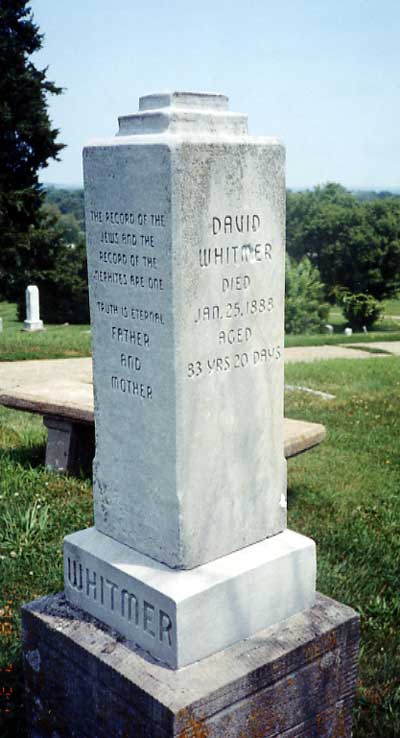
(Public domain photograph by Tom Denardo, from Wikimedia Commons)
John C. Whitmer was the son of Jacob Whitmer, one of the Eight Witnesses to the Book of Mormon. He was also the nephew of David Whitmer, one of the Three Witnesses, and likewise the nephew of Oliver Cowdery, another of the Three Witnesses. (Oliver had married Elizabeth Ann Whitmer, David and Jacob’s sister.) He was, furthermore, the nephew of four others among the Eight Witnesses: Christian Whitmer, Peter Whitmer Jr., and John Whitmer, and Hiram Page (who had already married Catherine Whitmer, another Whitmer sibling, back on 10 November 1825).
In other words, John C. Whitmer was exceptionally well placed to know two of the Three Witnesses and five of the Eight Witnesses, and, thus, to have an unusually good sense of their character and of what they had said with regard to the Book of Mormon. And yet he spent his entire adult life outside of the Church of Jesus Christ of Latter-day Saints and far removed from the main body of the Saints.
His parents, Jacob Whitmer and Elizabeth Schott, were married on 29 September 1825, so he would have been quite young when two of the Whitmer contingent among the Eight Witnesses died — Christian Whitmer (d. 27 November 1835) and Peter Whitmer Jr. (d. 22 September 1836), but, otherwise, this remarkable 1888 statement covers all of his Witness relatives:
I was closely connected with Hiram Page in business transactions and other matters, he being married to my aunt. I knew him at all times and under all circumstances to be true to his testimony concerning the divinity of the Book of Mormon. I was also at the deathbed of Oliver Cowdery in 1850, and I heard him speak to my Uncle David and say: ‘Brother David, be faithful to your testimony to the Book of Mormon, for we know that it is of God and that it is verily true.’ He then closed his eyes in death. My father, Jacob Whitmer, was always faithful and true to his testimony to the Book of Mormon, and confirmed it on his deathbed. Of my Uncle John I will say that I was with him a short time before he died at Far West, Missouri, when he confirmed to me what he had done so many times previously that he knew the Book of Mormon was true. I was also with Uncle David, who died here in January last, and heard him bear his last testimony in the presence of many witnesses whom he had called together for the occasion. He solemnly declared that the record of the Nephites, as he always called the Book of Mormon, was of God, and his testimony concerning it true. (cited at Ronald E. Romig, Eighth Witness: The Biography of John Whitmer [Independence, MO: John Whitmer Books, 2014], 475)
***
A new article – this one by Robert L. Millet – has appeared in Interpreter: A Journal of Latter-day Saint Faith and Scholarship:
“The Theology of C. S. Lewis: A Latter-day Saint Perspective”
Abstract: In this essay, Robert Millet describes the work and impact of C. S. Lewis as it pertains to the Latter-day Saints. He explores possible reasons why Church leaders have felt comfortable quoting Lewis in General Conference more than any other non-Latter-day Saint writer and provides a substantial list of the subjects for which his writings have had special appeal to the Saints. While acknowledging Lewis’ personal faults and the obvious points of difference between his faith and our own, Millet concludes with an expression of gratitude for his “lasting lessons and his noble legacy.”
[Editor’s Note: Part of our book chapter reprint series, this article is reprinted here as a service to the LDS community. Original pagination and page numbers have necessarily changed, otherwise the reprint has the same content as the original.
See Robert L. Millet, “The Theology of C. S. Lewis: A Latter-day Saint Perspective,” in “To Seek the Law of the Lord”: Essays in Honor of John W. Welch, ed. Paul Y. Hoskisson and Daniel C. Peterson (Orem, UT: The Interpreter Foundation, 2017), 189–208. Further information at https://interpreterfoundation.org/books/to-seek-the-law-of-the-lord-essays-in-honor-of-john-w-welch-2/.]
***
Those of you who speak German might enjoy this little item, in which a young Swiss man named Sandro Abderhalden, a member of the Church of Jesus Christ of Latter-day Saints in lives in the Zürich Oberland region, briefly introduces the Church to an audience that, on the whole, probably knows very little about us and isn’t disposed to be particularly friendly. He does a good job, I think. And he speaks in Swiss dialect, which I don’t get to hear very often these days:
***
The invaluable Jeff Lindsay has posted a nice, short piece on his Mormanity blog:
“An Update in the Scholarship Regarding the Archaic Language in the Book of Mormon”
***
Here are a couple of still relatively recent items from the important Neville-Neville Land blog:
“Jonathan Neville at the summit of confirmation bias”
“Those who live in glass houses, pt. 8”
***
Finally, as is my benevolent, selfless, and helpful practice, I append some links to a few items that might be useful to those who are still voraciously hungry for materials to stuff into their already bulging Christopher Hitchens Memorial “How Religion Poisons Everything” Files:
“Relief Society in Action, October 17, 2020”
“Record-Breaking Food Drive Cheers Calgarians”
Note: For at least a while, based upon discussion with folks at Patheos, I’ll be experimenting with a new approach to my blogging: Fewer posts, but longer. We’ll see how it works.












